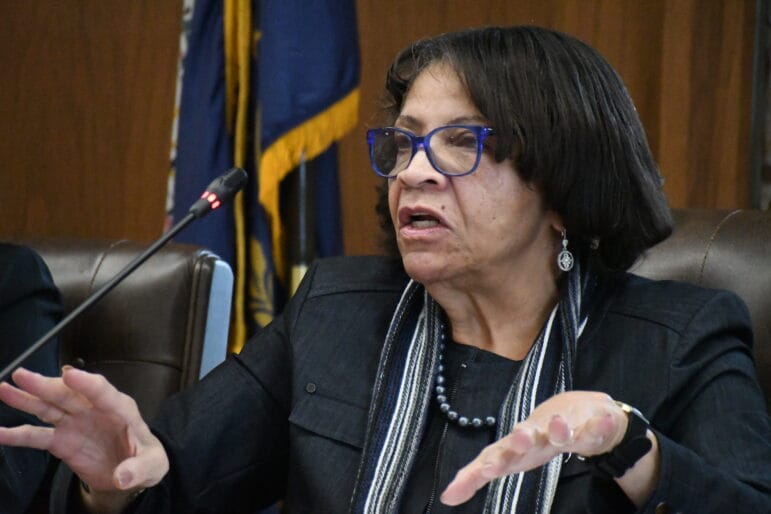Legislators bombarded with new landlord/tenant bills
Over the course of six hours last Wednesday, the New Hampshire House of Representatives Judiciary Committee heard eight bills related to the rights of tenants. Here’s a recap of discussion on those bills.
CONCORD, N.H. – Over the course of six hours last Wednesday, the New Hampshire House of Representatives Judiciary Committee heard eight bills related to the rights of tenants. Here’s a recap of discussion on those bills.

HB 112 provides tenants of multifamily homes 60 days of notice when the owner of the building of those homes seek to sell that building, giving the tenants time to organize efforts to give a good-faith offer to purchase that building.
Ellen Read (D-Newmarket) said that this bill seeks to emulate similar laws related to manufactured housing developments in the hopes of giving people that currently rent their homes a chance to stay in their homes.
The bill is agnostic in regard to what form of ownership would exist among the tenants as well the amount of tenants involved in the sale.
Supporters of the bill said that this would help people stay in their homes and help fight predatory landlords. Opponents of the bill said that it would limit the ability of landlords to sell their properties and that 60 days is not enough time to procure financing and complete other pre-sale tasks needed for the transfer of property.

Judiciary Chairman Bob Lynn (R-Windham) vacated the chair for this bill and testified on it as its prime sponsor.
Lynn told the committee that this bill came from a case he heard as a judge where he could not believe a landlord does not have the right to not renew a lease with a tenant just because their lease is running out. This bill would allow landlords to not renew leases of six months or more once they expire.
Currently under state law, if landlord does not have good cause to evict their tenant and the tenant does not agree to a new lease at the expiration of their lease, the existing lease goes into a month-to-month agreement. However, testimony from those concerned about this bill stated that landlords already have the defacto ability to evict tenants after leases expire by raising rents, something they can do once an existing lease expires.
Kathy Staub (D-Manchester) said that this would exacerbate homelessness, particularly with younger residents.
Nick Norman, an advocate for landlords, said that landlords generally do not want to evict tenants as that incurs legal fees, advertising costs and a lack of income when the unit remains vacant. He added that due to that, he believes that eviction only occurs when there is a bad tenant.
David Cline, a landlord on the seacoast, said that this bill would allow landlords such as himself to remove tenants who are bad but not “super bad,” using the example of a tenant who verbally harassed him but did not damage the property.
Rebecca McBeath (D-Portsmouth) spoke out against this line of thinking.
“Jerks have rights too,” she said.

This bill would expand landlord-tenant mediation programs that seek to avoid evictions by building compromise between landlords and tenants with disputes.
Charlotte DiLorenzo (D-Newmarket) said that the program currently allows approximately 80 percent of tenants that participate in it to stay in their homes.
Richard Head, a spokesperson for the New Hampshire Judicial Branch, enthusiastically supported the idea and said the only issue is funding, although COVID-related funds will be available until 2025.
He expected future needed grant funding would be approximately $500,000.

Read returned for this bill, which allows victims of domestic violence and stalking from lease obligations.
Read shared a personal experience as a victim of domestic violence in Tennessee who eventually hit her with a car and stalked her until he killed himself in 2016. She managed to escape from him, but feared what might have happened if she was tied to a lease agreement with him.
While the Violence Against Women Act allows this to happen with any housing that is funded through federal funds, that is not the case with other types of housing.
The bill also allows individuals who can no longer live in their apartments due to disabilities incurred after the beginning of their lease from their lease obligations, using the example of a man who lives in a third-floor apartment in a building without an elevator and lost the use of his legs.
Cline returned to oppose the portion of this bill discussing disabled tenants, expressing concern over vagueness over wording in the bill.
Normal also expressed concern that a tenant can give as little one day of notice to landlords in these situations, although he expressed sympathy for situations of domestic violence.
Judi Lanza (D-Goffstown) replied to Norman that often victims of domestic violence must leave immediately for the sake of their own safety.

Read returned another time for this bill, which limits the cost of background checks to $35, stating that some landlords don’t actually rent out their units and instead make their income from a stream of applicants paying for background checks.
She said that some of those fees can be more than $1,000 and some other states do not allow background check fees.
Cline said that that the $35 amount is arbitrary and that background checks allow landlords avoid issues that could cost them significant amounts later on.
Katlyn Kuttab (R-Windham) confirmed that the background checks in themselves are refundable, but learned that other related fees may not be.

Josh Adjutant (D-Enfield) spoke on this bill, which seeks to prohibit corporations owning residential properties, excluding corporations that already own residential properties.
The primary support of this bill came from individuals who said that corporate owners of properties were less likely to work with tenants to find resolution, exacerbating the rate of homelessness in the state.
Richard Tripp (R-Derry) asked if families would qualify as corporations, with Adjutant saying they would not, but then asked if a family could create a corporation for the sake of owning residential property in that case.
Eric Turer (D-Brentwood) said this harm property development and Tim Horrigan (D-Durham) said that this would impact wealthy individuals seeking to invest in communities and might move to New Hampshire.
Cline also returned by saying individuals generally do not have the needed capital to invest in large residential construction.

The fourth and final bill of the day for Read sought to create a program providing indigent tenants with attorneys.
The funding for the bill would begin with $1, but Read said that the office U.S. Senator Maggie Hassan (D-NH) is set to provide $3 million in federal funds for this initiative, and that the language in the bill can provide funding from public or private sources.
The expectation is that approximately $1 million to $1.5 million is needed for this program.
Turer asked if it made sense to define “indigent” as anyone making up to 200 percent of the federal poverty line. Read said that this is the standard legal definition of indigence, which relates to the ability to pay for services. In some cases, individuals making that amount cannot afford legal costs and often judges may allow individuals coming before the court to be identified as indigent in situations where they make more money than that.
Lynn asked why this was needed given that organizations exist to help poorer individuals coming before courts. Read said that this creates a framework and also those organizations only help people in criminal cases, not civil cases.

The final bill of the day would double the time frame of eviction from 30 to 60 days and would require landlords to find a comparable unit for tenants if they are temporarily evicted due to renovation.
Cam Kenney (D-Durham), the sponsor of this bill, said that there needs to be adequate notice if someone is about to be deprived of their housing.
Supporters of the bill said that landlords often use renovation as a method to evict tenants when they cannot otherwise evict tenants.
Matt Bacon, a realtor from Bedford, disputed this assertion. However, New Hampshire Legal Assistance spokesperson Sophia Hyatt said she sees this every day in Manchester District Court.
Chairman of the Special Committee on Housing, and Judiciary Committee member, Joe Alexander (R-Goffstown) released the following statement in response all of these bills and others heard last week.
“Everyone knows the housing crisis in New Hampshire is the result of a supply issue. Until we increase the supply of housing available in the state, we will not see any relief. The slew of bills we have seen this week attempt to solve the issue by increasing regulations on landlords.”
“It is completely illogical to institute laws such as not allowing newly renovated apartments to be put back on the market for a year, effectively leaving usable housing unoccupied. Encumbering landlords with increased regulations will only exacerbate the issue. We look forward to finding real solutions to a real problem without entertaining unreasonable proposals.”




